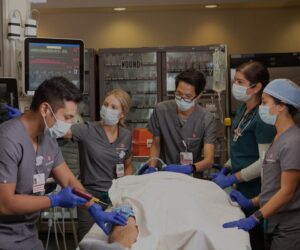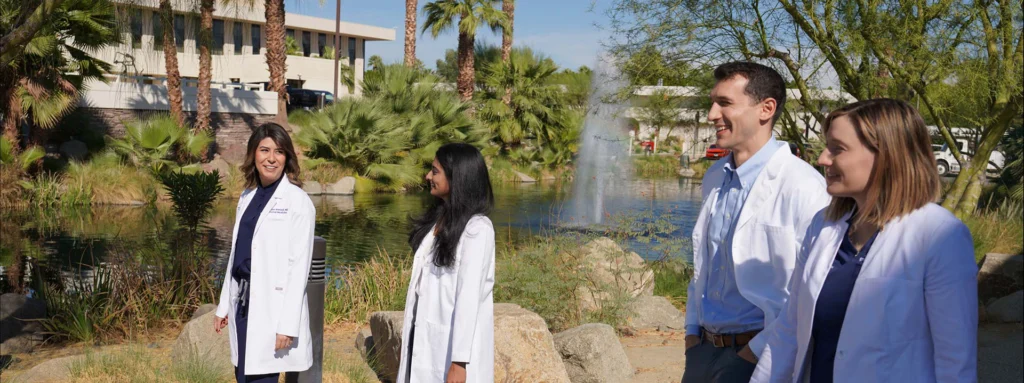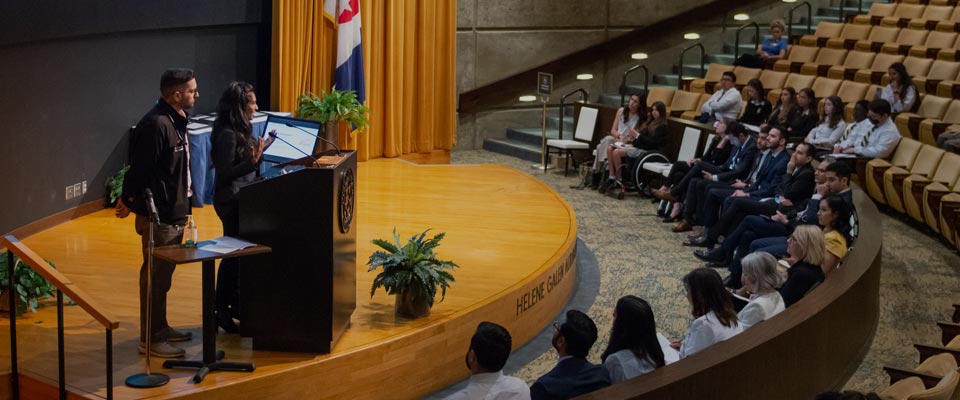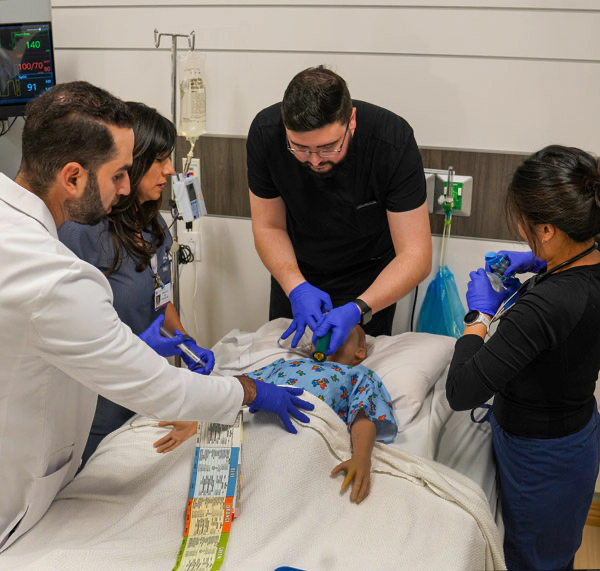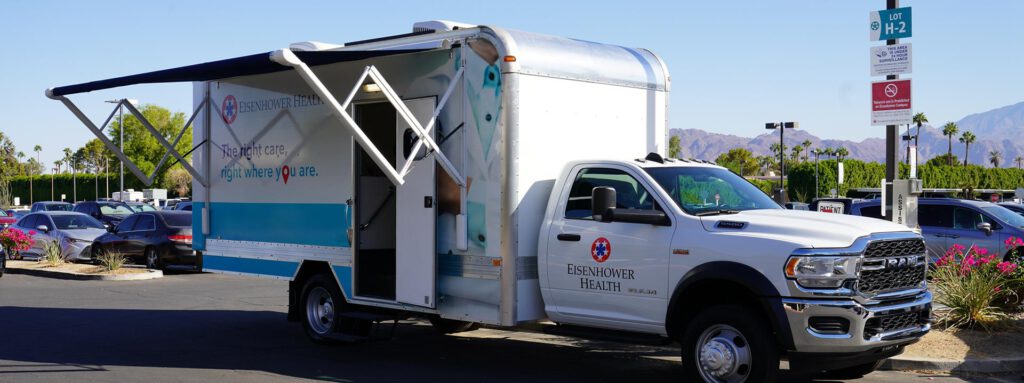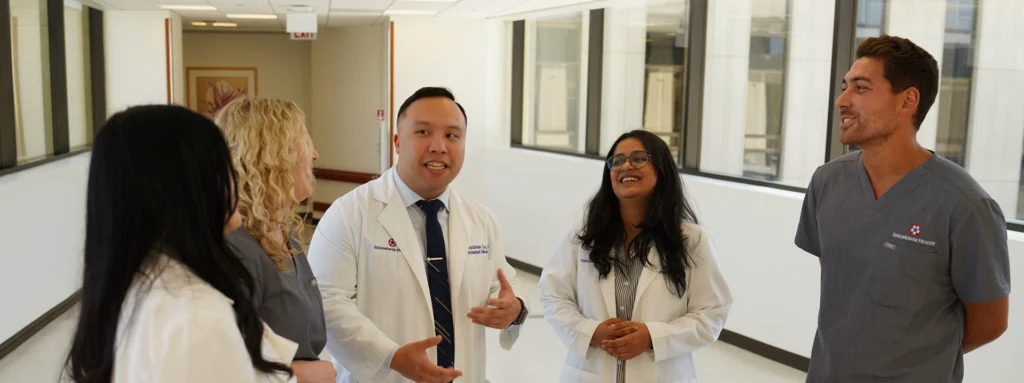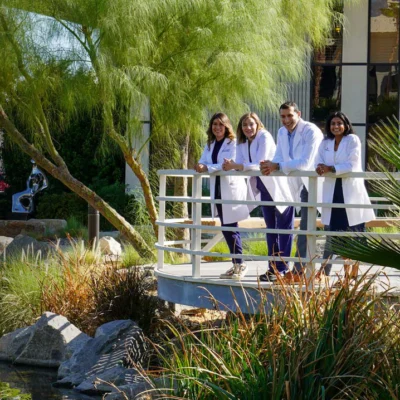Curriculum
About the Program Curriculum
The curriculum outlines the extensive learning opportunities that will ensure a complete understanding of the disease of addiction and its effects on overall health of the patient, loved ones and the community. Our curriculum focuses on neuroscience, psychopharmacology, neuroanatomy correlating with an array of evidence-based behavioral treatments patterned to each unique individual patient encompassing all of the population in the Coachella Valley and Los Angeles.
Seminar and Course Listing
- Annual Addiction Medicine Conferences (CSAM and ASAM)
- Motivational Interview/Enhancement seminars
- Behavioral Therapies for patients with substance use
- Addiction Medicine Journal and Book presentation
- Psychopharmacology, Neuroscience and Neuroanatomy lectures
- Core Addiction medicine didactics through ACAAM weekly National Didactics
- Clinical Case presentation, Grand Rounds and M&M
- Diversity, Equity and Inclusion lectures and seminars
- Quality Improvement and Root Cause Analysis participation
Core Competencies
Patient Care
A comprehensive assessment through evaluating, diagnosing, and treating patients who are experiencing substance-related health issues and substance use disorders (SUDs) across a spectrum of care. This includes delivering services in various settings, such as inpatient, residential facilities, outpatient treatment centers, correctional, early intervention programs, harm reduction initiatives, and prevention campaigns.
This approach aims to provide patients with a range of services to address their specific needs, and the care is delivered by an interdisciplinary team that includes addiction specialists, counselors, psychologists, family members, and other stakeholders involved in the patient's treatment. The team works together to provide individualized, evidence-based care that takes into account the patient's unique circumstances and medical history.
Services offered in these settings may include medically managed withdrawal programs, SUD treatment programs, consultation services, and integrated clinics, among others. The ultimate goal is to provide the best possible care to patients experiencing substance-related health problems and SUDs, enabling them to achieve sustained recovery and improved health outcomes.
Medical Knowledge
Pharmacology of most psychoactive substances, including alcohol, nicotine, stimulants, sedative-hypnotics, depressants, opioids, inhalants, hallucinogens, psychedelics and cannabinoids.
The impact of substance use, including psychosocial and medicolegal implications, in diverse populations and cultures, such as in women, neonates, children, adolescents, families, the elderly, sexual and gender minorities, patients with physical or mental trauma or other injuries, military personnel and dependents, health care professionals, employees, and persons involved in the criminal justice system.
Screening, brief intervention strategies appropriate to substance use risk level, and referral to treatment.
Behavioral treatment modalities employed in the treatment of substance use disorders such as CBT, DBT, Mindfulness-based relapse prevention, and 12-step facilitation.
Identification and treatment of common co-occurring conditions, such as medical, psychiatric, and pain conditions.
Familiarization with the different models of addiction such as:
- Biological model: This model suggests that addiction is primarily caused by changes in the brain's reward system, resulting in a compulsive desire to engage in addictive behavior.
- Psychological model: This model focuses on the role of psychological factors, such as stress, trauma, and mental health conditions, in the development and maintenance of addiction.
- Social model: This model emphasizes the social and cultural factors that contribute to addiction, such as peer pressure, social norms, and the availability of drugs or alcohol.
- Learning model: This model suggests that addiction is a learned behavior that is reinforced through repeated exposure to the addictive substance or behavior.
- Cognitive model: This model focuses on the role of cognitive processes, such as beliefs, attitudes, and expectations, in the development and maintenance of addiction.
Fellowship Evaluation
A formal biannual assessment of the clinical skill of all fellows will be conducted during their year of training, as per the requirements of the Accreditation Council for Graduate Medical Education (ACGME) Addiction Medicine program. The evaluation process and associated forms have been developed to ensure compliance with ACGME guidelines. Feedback will also be provided as opportunities arise and every rotation.
This assessment includes a multisource evaluation that encompasses the MedHub assessment form, faculty evaluations, resident self-assessment form, and peer evaluations. The assessment methodology includes direct observation, formative and summative evaluations, as well as formal and informal discussions to evaluate the clinical competence of the fellows.
The primary objective of this assessment process is to provide comprehensive feedback to the fellows to enhance their professional development. The evaluation process will identify areas of strength and weakness, and the fellows will receive constructive feedback to help them improve their clinical performance. This process also ensures that the program meets the ACGME requirements for Addiction Medicine training and guarantees that the fellows receive the necessary education and training to become proficient in the field.
Fellowship Scholarly Activities
The Addiction Medicine fellowship program offers fellows a unique opportunity to engage in scholarly activities and research projects that will enrich their professional development. Fellows are expected to participate in academic journal clubs, which foster discussions on cutting-edge research, and will have the opportunity to present their findings at departmental grand rounds. This collaborative environment provides an excellent platform for fellows to engage in academic discourse, share their ideas, and learn from peers.
The program recognizes the importance of research and quality improvement (QI) projects and actively encourages fellows to pursue these endeavors. The fellows will have access to faculty mentors who are well-versed in research methodology and will provide guidance throughout the research process. In addition, the department supports attendance at national conferences for presentations, where fellows can present their findings and connect with experts in the field.
To further support the fellows' research efforts, Eisenhower Health holds an annual Research Day where trainees have the opportunity to showcase their scholarly activities. This event is a joyful celebration of the work accomplished and provides a forum for fellows to share their findings with the broader academic community.
Overall, the Addiction Medicine fellowship program is committed to providing a comprehensive educational experience that enables fellows to excel in their professional endeavors. Through its focus on scholarly activities and research projects, fellows can develop skills and expertise that will support their careers and enrich their personal lives.
